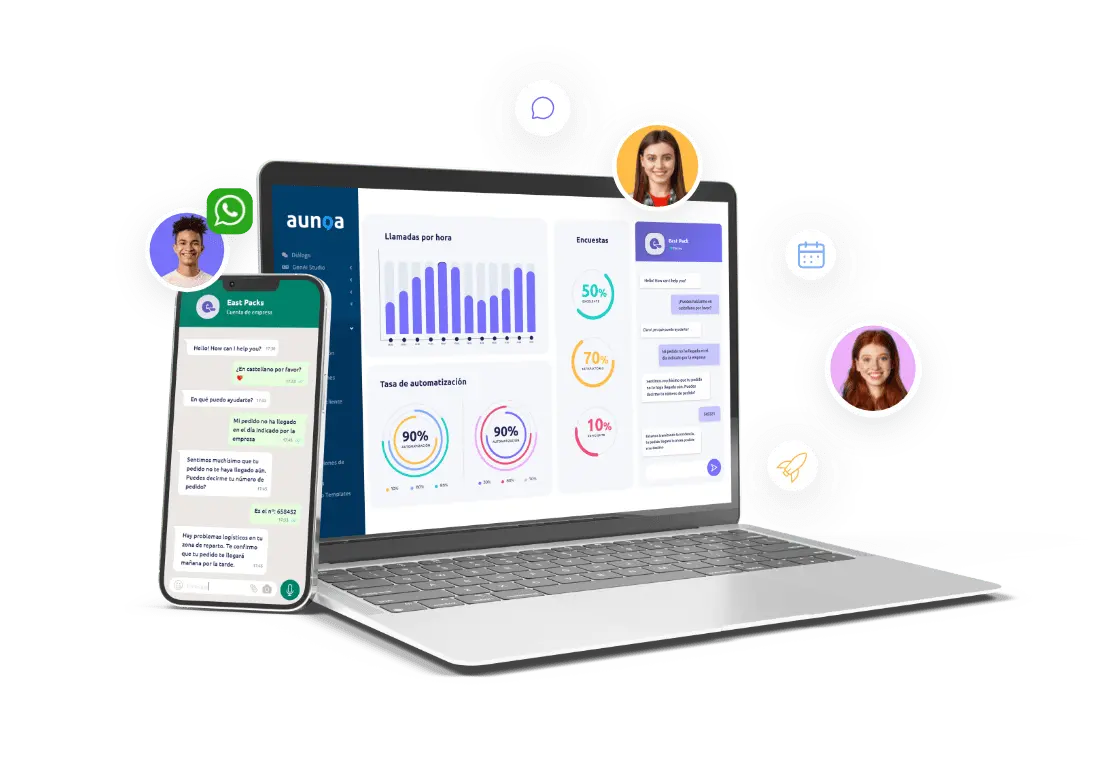Artificial Intelligence (AI) is one of the tools that has most transformed the way companies interact with their customers in recent years, improving their experience with the brand and consolidating solid and lasting relationships.
A clear example of this trend is the integration of Artificial Intelligence in WhatsApp Business, a booming business messaging platform that currently has more than 200 million users, a database that has quadrupled in the last three years. Have you already integrated this communication channel in your company? If you are looking to transform and optimize your business, keep reading this article in which we will explain how AI works in WhatsApp Business and how you can take advantage of all its benefits.
How does Artificial Intelligence work in WhatsApp Business?
WhatsApp Business represents the evolution of the WhatsApp instant messaging platform towards a commercial approach. Its reputation and ease of use have made it the sales platform of choice for many companies that have been able to apply the benefits of its features thanks to AI. In Spain, 7 out of 10 companies choose this platform to communicate with their customers.
Artificial Intelligence in WhastsApp Business is based on the concept of chatbots, an application designed to interact with users in a conversational manner similar to that of a human agent. These chatbots use natural language processing(NLP) algorithms to understand and respond to user messages in a consistent and contextual manner. The benefits of incorporating AI into WhatsApp Business are notable, as we will see below, from quick and personalized responses to increased operational efficiency.
Benefits of incorporating Artificial Intelligence in WhatsApp Business
The incorporation of Artificial Intelligence in WhatsApp Business offers a number of significant benefits for companies looking to improve their customer service and optimize their operations. Some of these benefits include:
1. Rapid response and 24/7 availability
AI enables companies to provide instant responses to customer inquiries at any time of the day, even outside of business hours. This real-time attention enhances the customer experience by providing quick responses and eliminating the need to wait long periods for assistance.
2. Personalization and segmentation
Artificial Intelligence makes it possible to analyze customer data to understand their preferences and behaviors. This advance allows companies to offer personalized recommendations and promotions, which increases the chances of generating sales and keeping customers engaged with a brand.
3. Operational efficiency
Automating repetitive tasks through AI frees up time for employees to focus on more strategic activities. AI can handle tasks such as initial sorting of queries and scheduling appointments, increasing operational efficiency.
4. Advanced Data Analysis
La IA puede analizar grandes cantidades de datos generados por las interacciones withwithlos clientes. Esto proporciona información valiosa sobre las tendencias, preferencias y áreas de mejora, lo que permite a las empresas tomar decisiones más informadas.
5. Analysis of the tone of interactions
Artificial Intelligence is able to detect the emotional tone of the conversations you have with your customers on WhatsApp. This information is very valuable, as it allows companies to improve and adapt the focus of their conversational marketing to the behavior, needs and expectations of users.
How the WhatsApp Business chatbot works
The WhatsApp Business chatbot is a basic service that allows you to automate simple tasks such as welcome or away messages, as well as quick responses to frequently asked questions. WhatsApp Business chatbots operate in a staged process that involves from receiving a message to delivering a response. The key stages are:
- Message Reception: When a customer sends a message to a company’s WhatsApp Business account, the chatbot receives the message and starts the analysis process.
- Natural Language Processing (NLP). The chatbot uses natural language processing algorithms to understand the user’s message. This involves identifying keywords, understanding the user’s intent and analyzing the context to provide a relevant response.
- Response Search. Once the user’s message has been analyzed and understood, the chatbot searches its database of predefined responses or can generate a real-time response if needed.
- Response Generation. The chatbot generates a response that is consistent with the user’s message and detected intent. The response is based on patterns learned from previous data and can include text, links or even images.
- Response Delivery. Finally, the chatbot delivers the response to the user via WhatsApp. If the answer satisfies the user, the interaction can be considered complete. If the user has further questions or requests more information, the process can be repeated.
If you want to start using a WhatsApp Business chatbot, it is necessary to have a business profile on the platform and configure the message and response automation so that the Artificial Intelligence knows how to guide the customer in their doubts and queries.
Technical implementation of chatbots in WhatsApp Business
To start using the WhatsApp Business chatbot, it is necessary to have a business profile on the platform and set up message and response automation so that the Artificial Intelligence knows how to guide the customer in their doubts and queries. The technical steps to implement a chatbot include:
- Creating a WhatsApp Business account: Set up a verified WhatsApp Business account.
- Integration with an AI solution provider: Choose a provider that offers AI and NLP solutions for creating and managing chatbots.
- NLP Algorithm Configuration: Customize natural language processing algorithms to suit specific business needs.
- Knowledge base development: Create a database of predefined answers and train the chatbot with historical data from customer conversations.
- Testing and tuning: Perform extensive testing of the chatbot and adjust its responses and algorithms as needed.
- Deployment and monitoring: Deploy the chatbot in the production environment and monitor its performance continuously to make improvements.
Privacy and security
Privacy and security of customer data are crucial when using chatbots in WhatsApp Business. Companies must ensure that data is protected through end-to-end encryption, and must comply with regulations such as GDPR. It is essential that companies inform users about how their data is used and obtain their consent.
Costs and return on investment (ROI)
Implementing an AI chatbot in WhatsApp Business involves upfront and recurring costs. These can include development and customization of the chatbot, as well as monthly fees for platform usage and ongoing maintenance. However, the return on investment can be significant through improved operational efficiency, increased customer satisfaction and personalized interactions.
Limitations and challenges
Despite the benefits, there are limitations and challenges to using AI in WhatsApp Business. Chatbots may have difficulty understanding complex or ambiguous messages, and may require human intervention in certain cases. In addition, the accuracy of NLP algorithms can vary, especially when dealing with different languages or dialects.
Regulations and compliance
Companies must ensure they comply with all local and international regulations when using AI in messaging platforms. This includes GDPR compliance in Europe, which requires strict measures to protect users’ personal data.
Integration with other systems
Integrating AI in WhatsApp Business with other enterprise systems, such as CRM, ERP and e-commerce platforms, can provide a more seamless and personalized experience for customers. This allows companies to centralize data management and improve operational efficiency.
Training and education
It is essential to provide adequate training to staff who will administer and maintain the AI systems in WhatsApp Business. This includes training in the use of the platform, data management and technical troubleshooting.
The integration of AI into WhatsApp Business offers numerous benefits for businesses, from improving operational efficiency to providing a personalized customer experience. However, to take full advantage of these benefits, it is crucial to address issues such as privacy and security, technical implementation, costs and regulatory compliance. In doing so, companies can transform and optimize their operations, strengthening their customer relationships and ensuring their long-term success.






